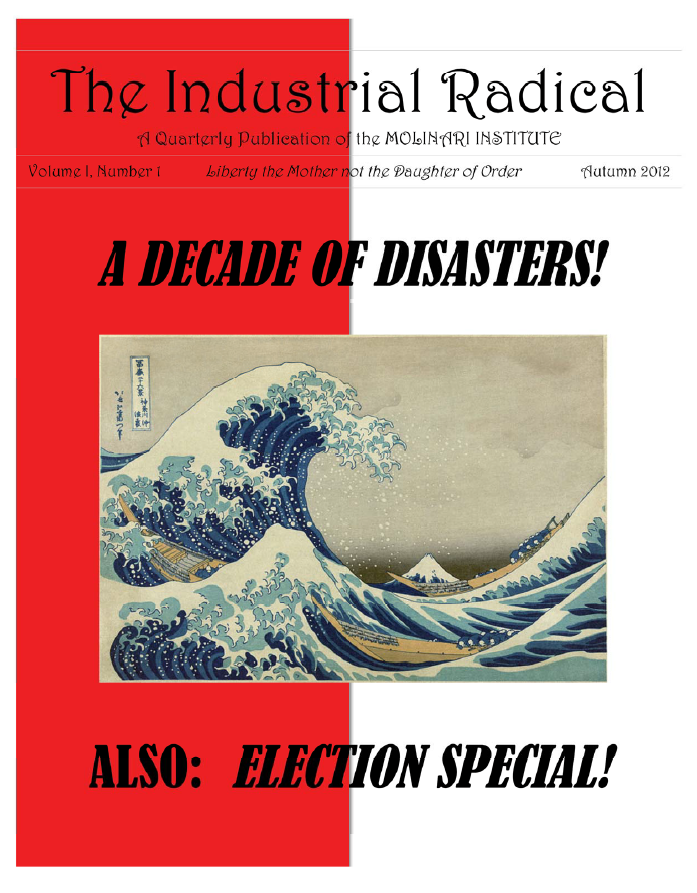 The Industrial Radical, the new quarterly magazine of the Molinari Society (which is affiliated with the Center for a Stateless Society, to which I serve as an Adviser), has a great copyright policy (see below). I give my reasons for preferring CC-BY to CC-BY-SA in Copyright is very sticky!, so I’m glad they give the CC-BY option in addition to their default CC-BY-SA.
The Industrial Radical, the new quarterly magazine of the Molinari Society (which is affiliated with the Center for a Stateless Society, to which I serve as an Adviser), has a great copyright policy (see below). I give my reasons for preferring CC-BY to CC-BY-SA in Copyright is very sticky!, so I’m glad they give the CC-BY option in addition to their default CC-BY-SA.
Industrial Radical Copyleft Policy
The editors of The Industrial Radical reject the concept of “intellectual property,” and we favor the abolition of all patent and copyright restrictions. We regard the intellectual enclosure of patents and copyrights as a constraint on minds and markets, an invasion of individual rights, and an increasingly destructive form of protectionism. A free society means free minds and free culture; so we’ve adopted a policy ofcopyleft for the magazine. To paraphrase the Free Software Foundation’s explanation, proprietary content uses copyright to take away readers’ freedom; free content makes creative use of copyright to guarantee their freedom. That’s why we reverse the name, changing “copyright” to “copyleft.” Everything we print will either be certified in the public domain, or released under a free content license that guarantees your ability to reprint or reuse, without permission or restriction.
Licenses and Legal Details
As a contributor to the Industrial Radical, you retain copyright over the work you contribute. But you agree to make your work available under a license that will protect the rights of others to reprint and reuse without the restriction of intellectual property monopolies. In order to keep things as simple as possible, we strongly prefer works that are licensed under the most up-to-date version of the Creative Commons Attribution-ShareAlike license, currently CC BY-SA 3.0. CC BY-SA frees readers to reproduce, reprint, and reuse the work so long as they (1) properly credit you as the creator of the original work, and (2) keep their copies or derive works under the same copyleft license, spreading freedom from restrictive copyright wherever they print it.
If you need to request an alternative arrangement, for legal reasons or reasons of personal preference, we can also accept work that has been certified in the public domain, or which is held under other free content licenses, such as CC-BY 3.0, older versions of the Creative Commons licenses, the GNU Free Documentation License, or other, similar free content licenses.
We will not print any works under licenses that impose restrictions on the distribution of copies or derivative works beyond the requirements that these works provide honest credit and remain free. The purpose of our copyleft policy is to enable free use, not to restrict it selectively. In particular, we won’t publish any works under the restrictions of Creative Commons NonCommercial or NoDerivs license terms.
Related Links
- Charles Johnson (2003-11-06): Copyleft and Copyright: The Prospects for Liberty
- Creative Commons
- Free Software Foundation: What is Copyleft?
- Roderick T. Long (1995): The Libertarian Case Against Intellectual Property Rights
- Molinari Institute: Anti-Copyright Resources
- Center for the Study of Innovative Freedom





You reprinted our policy without our permission? You’ll be hearing from our lawyer!
You must log in to post a comment. Log in now.